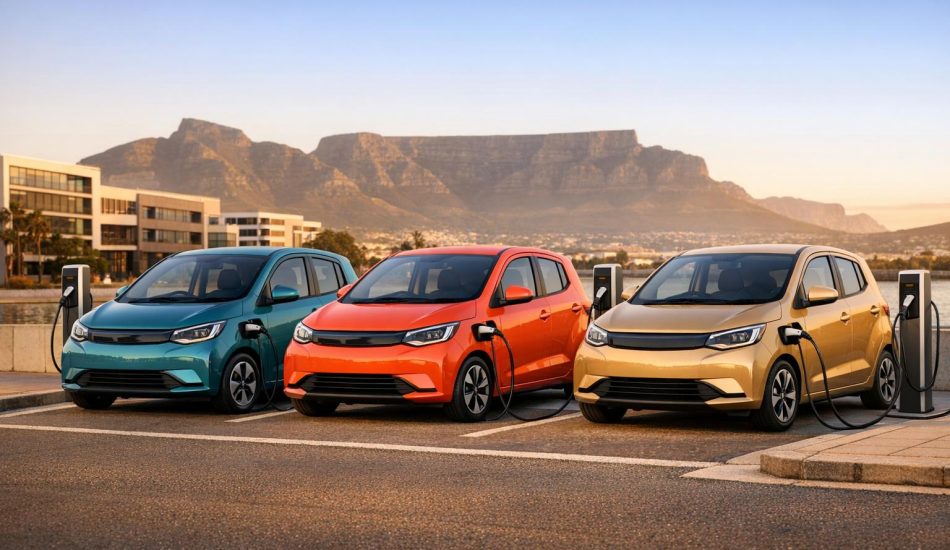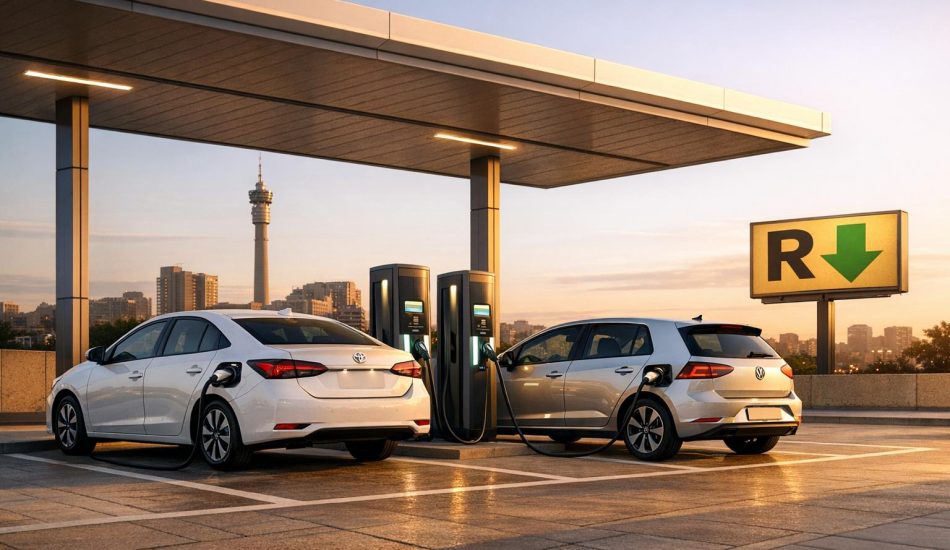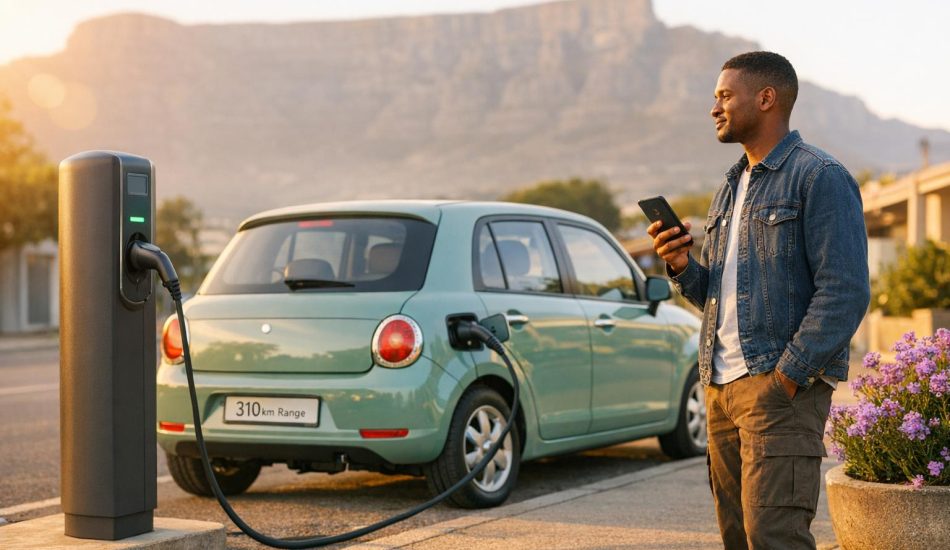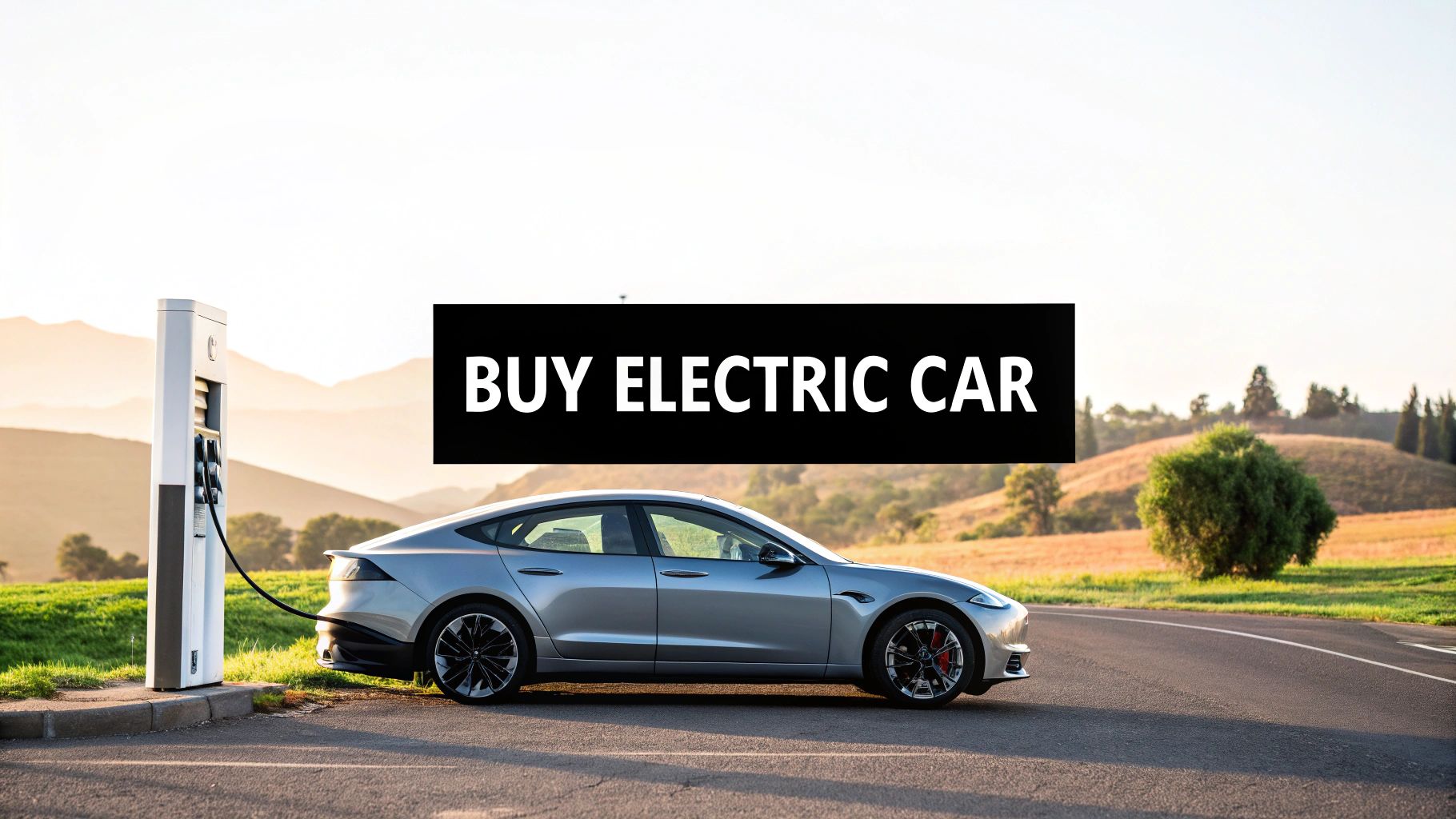
Thinking about buying an electric car in Tanzania? It’s a lot more realistic than you might think. With fuel prices constantly on the rise and a growing appetite for greener transport, electric vehicles (EVs) are becoming a seriously smart choice for Tanzanian drivers. You get long-term savings and do your bit for the environment—it’s a win-win.
The EV Opportunity in Tanzania Today
Driving an electric car in Tanzania is no longer just a futuristic idea; it's happening right now. This isn't just about following a global trend. It’s a real, local opportunity with tangible benefits, and more people are catching on. Tanzania is quietly positioning itself as a prime market for EVs, helped along by supportive government policies and a genuine interest from drivers who want cleaner, cheaper transport.
The advantages are clear. First, the savings are huge. With an EV, you can forget about weekly trips to the petrol station, oil changes, and a lot of the usual maintenance that comes with a combustion engine. For a typical driver in Dar es Salaam or Arusha, this can translate into millions of shillings saved over the life of the car.
Then there's the environmental side of things. Every single EV on the road helps clean up the air in our cities, which is a massive plus for everyone's health and our country's future. If you want to dig deeper into why now is the perfect time to make the switch, check out our article on how EV24.africa brings affordable electric cars to Tanzania.
Understanding the Market Growth
It’s true that the initial price of an EV can seem a bit steep, but it's crucial to see it as a long-term investment. The market itself is showing incredible potential. Projections show the Tanzanian EV market is expected to grow from USD 0.04 billion in 2025 to USD 0.22 billion by 2030.
That’s a compound annual growth rate (CAGR) of about 40.5%—a clear sign that there’s strong confidence in the future of electric mobility here.
For many people, the biggest hurdle is perception, not reality. The truth is, charging infrastructure is growing, and for most daily driving, charging at home overnight is all you'll ever need. The challenges are real, but they're getting smaller every day as the whole ecosystem matures.
Of course, it’s not without its challenges. The public charging network is still in its infancy, and the upfront cost can be a barrier for some. But these are just steps in the journey toward a more sustainable and affordable way of driving. This guide is here to walk you through it, giving you the confidence to navigate your first EV purchase and become a part of Tanzania's clean energy movement.
Before you dive in, it helps to get a clear picture of what to focus on. We've put together a quick table to highlight the most important things to consider.
Key Considerations for Buying an EV in Tanzania
| Factor | Key Details to Consider | Why It Matters for You |
|---|---|---|
| Your Daily Commute | How many kilometres do you drive each day? Is it mostly city driving or long-distance travel? | This directly impacts the battery range you'll need. Most affordable EVs are perfect for city commutes. |
| Home Charging Setup | Do you have a secure place to park and charge your car overnight, like a private driveway or garage? | Home charging is the cheapest and most convenient way to keep your EV topped up for daily use. |
| Public Charging Access | Are there public charging stations along your frequent routes or in your city? | While not essential for daily driving, it's good to know your options for longer trips or emergencies. |
| Total Cost of Ownership | Look beyond the purchase price. Factor in savings on fuel, maintenance, and potential tax benefits. | An EV might cost more upfront but can save you millions of shillings in running costs over a few years. |
| Vehicle Type and Size | Do you need a compact city car, an SUV for the family, or something for business? | The EV market has a growing variety of models to suit different needs and lifestyles. |
Thinking through these points will give you a solid foundation and help you choose an EV that genuinely fits your life.
Choosing the Right EV for Tanzanian Roads
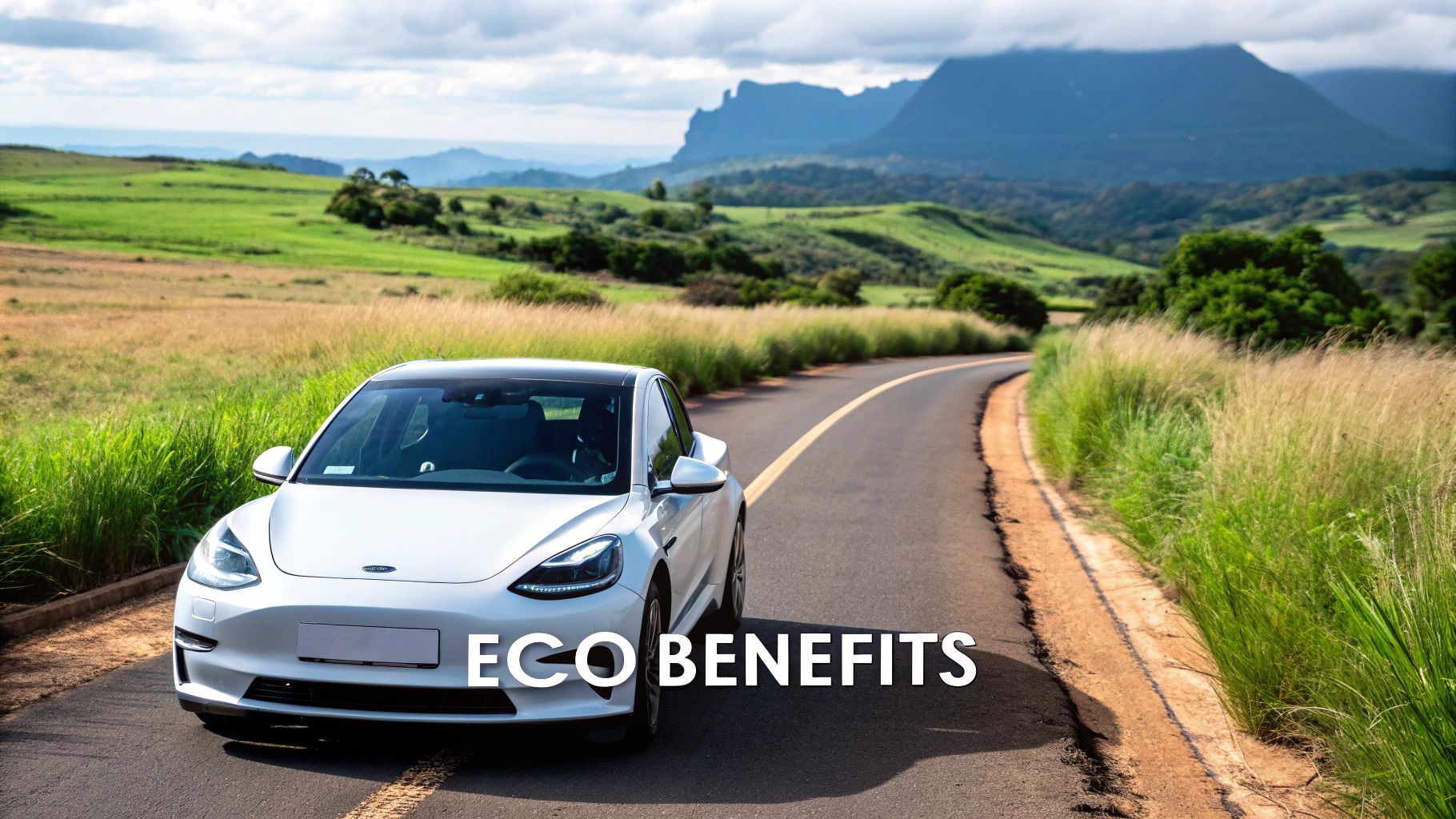
When you start thinking about buying an electric car in Tanzania, it's easy to get caught up in the latest models and features. But the real challenge isn't about picking a colour; it's about finding a vehicle that truly fits your life here. A car that handles European motorways with ease might not be the best companion for the journey from Dar es Salaam to Morogoro.
The trick is to be honest about your real-world needs. Will you be navigating the daily city traffic, or are you dreaming of long-distance adventures across the country? Your answer to that question will shape everything, from the battery size you need to the kind of suspension that will keep you comfortable on our varied roads.
Battery Range and Real-World Distances
Let's talk about battery range. It's one of the first specs people look at, but the manufacturer's official number is only half the story. You need to think about what that number means in the Tanzanian context. For instance, a model with a real-world range of 300 km is plenty for daily runs around Dar es Salaam. A trip to Arusha, however, would demand some serious planning.
Think about your driving habits:
- The Urban Driver: If your world revolves around the city, a smaller, more nimble EV like the Geely Panda Mini could be a fantastic choice. It’s easy to park, and its range is more than enough for your daily commute and errands.
- The Long-Distance Traveller: If you frequently travel between cities, you'll need a vehicle with a beefier battery, like a BYD Song Plus EV. This gives you the freedom to cover long distances without constantly worrying about the next charging stop.
Your lifestyle is the ultimate guide. A city professional has entirely different needs from a family who loves weekend getaways to the national parks. The "right" EV isn't just the one with the biggest battery; it's the one whose range comfortably handles your typical daily and weekly travel.
For a much deeper look into this, our comprehensive guide on choosing the right EV for your needs in Africa is packed with insights to help you make a confident choice.
Ground Clearance and Road Conditions
Tanzania offers a mix of road surfaces, from smooth tarmac on the main highways to bumpy, unpaved tracks in rural areas. This is why ground clearance—the space between the road and the underside of the car—is a non-negotiable factor. An EV with low clearance might feel great in the city but could easily run into trouble with potholes or uneven terrain elsewhere.
This is a big reason why electric SUVs and crossovers are gaining so much traction here. They give you the brilliant efficiency of an EV motor but with the robust build and higher ride height needed to handle whatever the road throws at you. As you browse different models on EV24.africa, keep a close eye on this number.
One final thought: parts and servicing. Choosing a brand that's becoming more common in the region, like BYD or Hyundai, can be a smart move. It often means local mechanics have more experience with them and that spare parts are easier to find. It's a small detail that can save you a lot of time and headaches later on.
How to Navigate the Import Process
Let’s be honest, importing a car can feel a bit daunting. But with a partner like EV24.africa, it’s a lot more straightforward than you might think. This is the part of the journey where your chosen EV goes from being a listing on a screen to your actual car, ready to hit the roads in Tanzania. It all starts with finding the right model and giving it a thorough digital check-up.
The real secret to a confident overseas purchase is the vehicle condition report. Think of it as the car's medical history. It gives you a detailed look at everything from the battery’s health to the tiniest scratch, so you can feel completely comfortable when you decide to buy an electric car in Tanzania from halfway across the world.
Securing Your Purchase and Understanding Costs
Once you've got your heart set on a car and you’re happy with its condition report, it's time to talk money. When you're dealing with international transactions, it's worth looking into different payment options. For a bit of background, understanding cross-border payment solutions can help make sure your transfer is both safe and smooth.
You'll come across the term CIF (Cost, Insurance, and Freight) a lot. This is key. When a price is listed as CIF, it means the seller is covering the cost of the car itself, the insurance while it's on the ship, and all the freight charges to get it to the Port of Dar es Salaam. Getting your head around what CIF covers is crucial for budgeting—no one likes surprise fees.
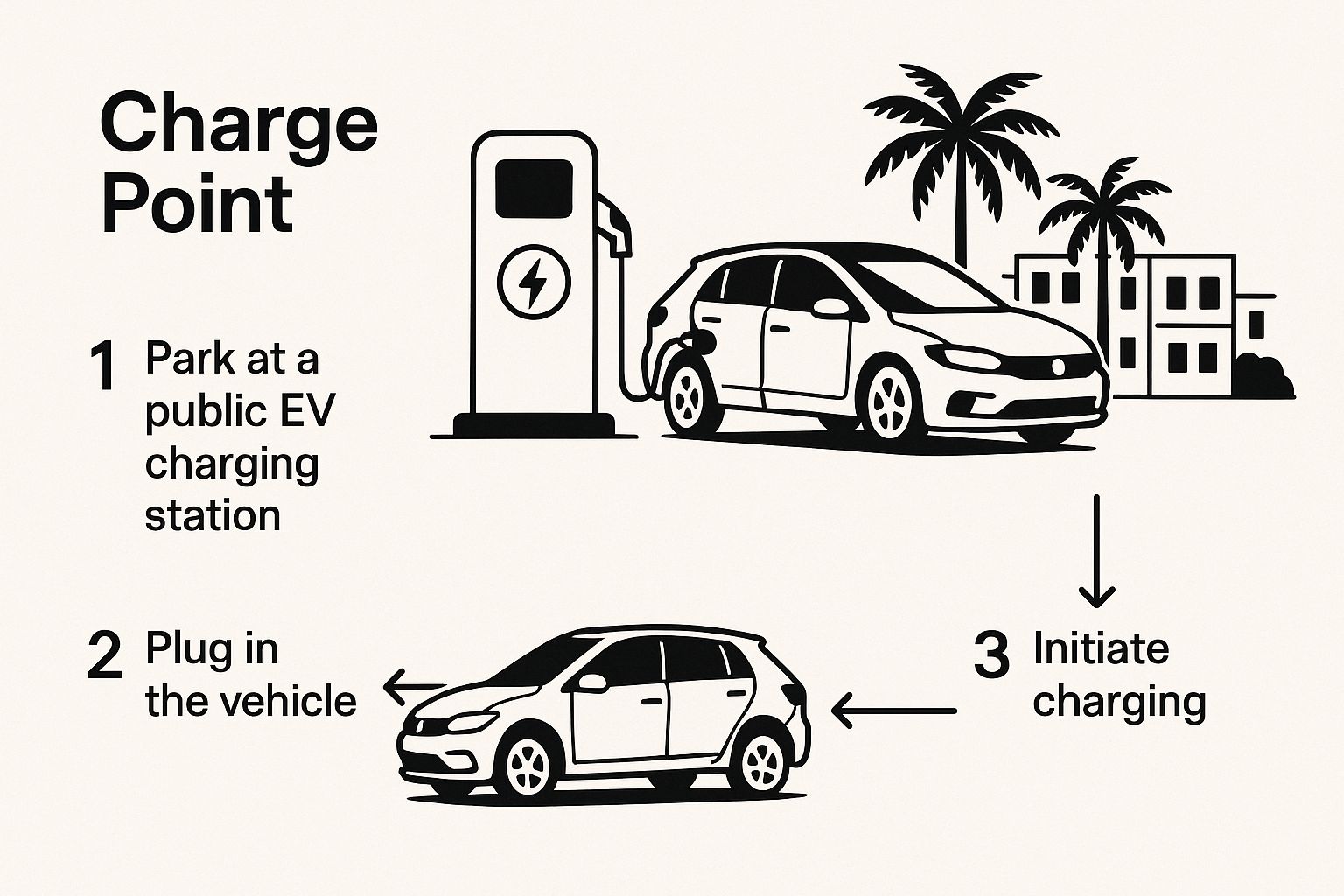
As you can see, the journey doesn’t just end at the port. It connects directly to the practical side of EV ownership, like having reliable places to charge.
From Paperwork to Port Arrival
With the payment sorted, the process shifts to logistics—the paperwork and the journey itself. This is where having an experienced team on your side really pays off. They’ll handle all the essential documents, like the bill of lading and export certificate, to keep things moving without a hitch. You'll get regular updates, so you can track your car's voyage across the ocean.
A Quick Tip from Experience: The waiting period is often the most nerve-wracking part for first-time importers. But with modern tracking and clear communication, this "waiting game" turns from uncertainty into excitement. You'll know exactly where your car is and have a good idea of when it will arrive.
It's a great time to be making this move. The wider Tanzanian car market has been on a roll, showing a solid 17.4% increase in sales in the first half of 2025. This isn't just a number; it points to a healthy economy and growing consumer confidence.
Of course, the whole import process is built on a framework of specific rules. To make sure you're ready for customs and clearance, it's vital to know the ins and outs. We've put together a comprehensive resource to help you with that: https://www.ev24.africa/tanzania-ev-import-rules-2025-what-to-know-before-you-buy/. Give it a read so you're fully prepared.
Getting to Grips with Import Taxes and Fees
Alright, so your EV has landed at the Port of Dar es Salaam. This is the final financial hurdle before you're out on the road. It’s really important to understand that the price you paid for the car itself is only part of the final equation. Getting a handle on the taxes and fees is key.
The good news? The Tanzanian government is actively encouraging the shift to clean transport, and they've put some fantastic incentives in place for EVs that will save you a serious amount of cash.
Navigating the charges from the Tanzania Revenue Authority (TRA) might seem daunting, but it's simpler than you think, especially for an electric vehicle. When you buy an electric car in Tanzania, you sidestep many of the heavy duties that come with a standard petrol or diesel car. This isn’t by accident; it's a deliberate move to make EVs more accessible.
The Key Costs You Need to Know
The main charges are typically import duty, excise duty, and Value Added Tax (VAT). For a regular car, these can really stack up. For an EV, though, the picture is much rosier.
- Import Duty: This is the standard tax on goods brought into the country. EVs often get a friendlier rate here.
- Excise Duty: This is a big one. It's a tax on specific goods, and for conventional cars, it can be hefty. For fully electric vehicles, you're usually looking at a complete exemption. That’s a massive saving right there.
- VAT: The standard VAT rate is 18%. However, the government currently offers a 100% VAT exemption on electric vehicles. This is what truly brings the final price down.
Honestly, these exemptions are a game-changer. We're not talking about small discounts. This can easily slash tens of millions of shillings off the total tax bill you'd face with a comparable petrol car, making the upfront cost of going electric far more competitive.
Let's put this into a real-world context to see how it all adds up.
Estimated Cost Breakdown for Importing an EV
To give you a clearer picture, here's a sample calculation of the taxes and fees you might expect when importing a popular mid-range EV, like a BYD Dolphin Active, with a CIF (Cost, Insurance, and Freight) value of around $11,800.
| Cost Component | Description | Estimated Percentage or Amount |
|---|---|---|
| CIF Value | The total cost to get the car to the Port of Dar es Salaam. | ~$11,800 |
| Import Duty | The standard rate is 25%, but this can be reduced for EVs. | Typically reduced |
| Excise Duty | A tax on specific goods, often high for luxury cars. | Exempt for fully electric vehicles |
| VAT | Value Added Tax is currently 18%. | Exempt for fully electric vehicles |
| Registration Fees | Fixed government fees for number plates and initial registration. | Varies, but standard for all vehicles |
| Port & Clearing Fees | The cost for handling, processing, and agent services at the port. | Varies based on the agent and car value |
As you can see, the exemptions on excise duty and VAT are where the real magic happens. This is what makes the decision to buy an electric car in Tanzania not just a smart choice for the environment, but a financially savvy one too.
When you work with an experienced partner like EV24.africa, we handle all of these calculations for you with complete transparency. No nasty surprises, just a clear, confident budget from the start.
Daily Life with Your EV in Tanzania
So, you've done it. Your new electric car has cleared customs, it's registered, and the keys are in your hand. This is where the real fun begins—weaving your EV into the fabric of your daily life. The first thing you'll notice? No more weekly trips to the petrol station. Your new routine is built around the incredible convenience of charging right where you park.
It's a huge mental shift, but a welcome one. Realising your home is now your primary fuelling station changes everything. Waking up to a full "tank" every single morning becomes the new standard, giving you more than enough range for daily commutes around Dar es Salaam, errands in Arusha, or trips across Dodoma. It's a fundamental change in how you think about owning a car.
Embracing Home Charging
Getting set up for home charging is much simpler than you might think. Most EV owners in Tanzania opt for a dedicated Level 2 charger. It's significantly faster than plugging into a standard wall socket, and an electrician can usually get one installed in your garage or parking spot in just a few hours, connecting it directly to your home's electrical panel.
With this setup, your car is always ready when you are. Just plug it in when you get home from work and unplug it before you head out the next day. Honestly, for the vast majority of your driving, this is the only charging you’ll ever need to do.
Navigating Public Charging and Maintenance
Okay, so home charging handles the daily grind. But what about those longer trips? The public charging network in Tanzania is growing. You'll find stations popping up in major city centres, at modern shopping malls, and along key highways. A little bit of planning is all it takes for intercity travel. Apps like PlugShare are brilliant for mapping out available stations along your route.
Now for one of the best parts of owning an EV: the maintenance—or lack thereof. Say goodbye to oil changes, spark plug replacements, and finicky exhaust systems. The mechanics of an electric car are just so much simpler, which means fewer parts to break down.
Of course, it's not completely maintenance-free. Here are a few things to keep an eye on:
- Tyres: The instant torque from an electric motor can be a bit tough on tyres, so you might notice they wear a little faster. Regular pressure and tread checks are a good idea.
- Brakes: Thanks to regenerative braking, your brake pads get a much easier life. They're used far less often, but you'll still want them inspected regularly for safety.
- Battery Health: Modern EV batteries are built to last for years, but scheduling an annual diagnostic check is a smart move to keep it performing at its best.
The decision to buy an electric car in Tanzania is about more than just saving money on fuel. It's about being part of a bigger shift towards cleaner, smarter transport that’s really picking up steam across the region.
This isn't just happening in a vacuum. The move to electric vehicles in East Africa is part of a much larger trend. You've got countries like Kenya and Rwanda pushing strong incentives to accelerate the transition, creating a really supportive environment. In fact, projections show the African EV market is on track to generate nearly $210 million in revenue by 2025.
You can get more insights on the future of EV sales in Africa on EV24.africa. As this ecosystem of chargers, technicians, and fellow drivers grows, owning an EV in Tanzania is only going to get easier and more rewarding.
Your EV Questions Answered
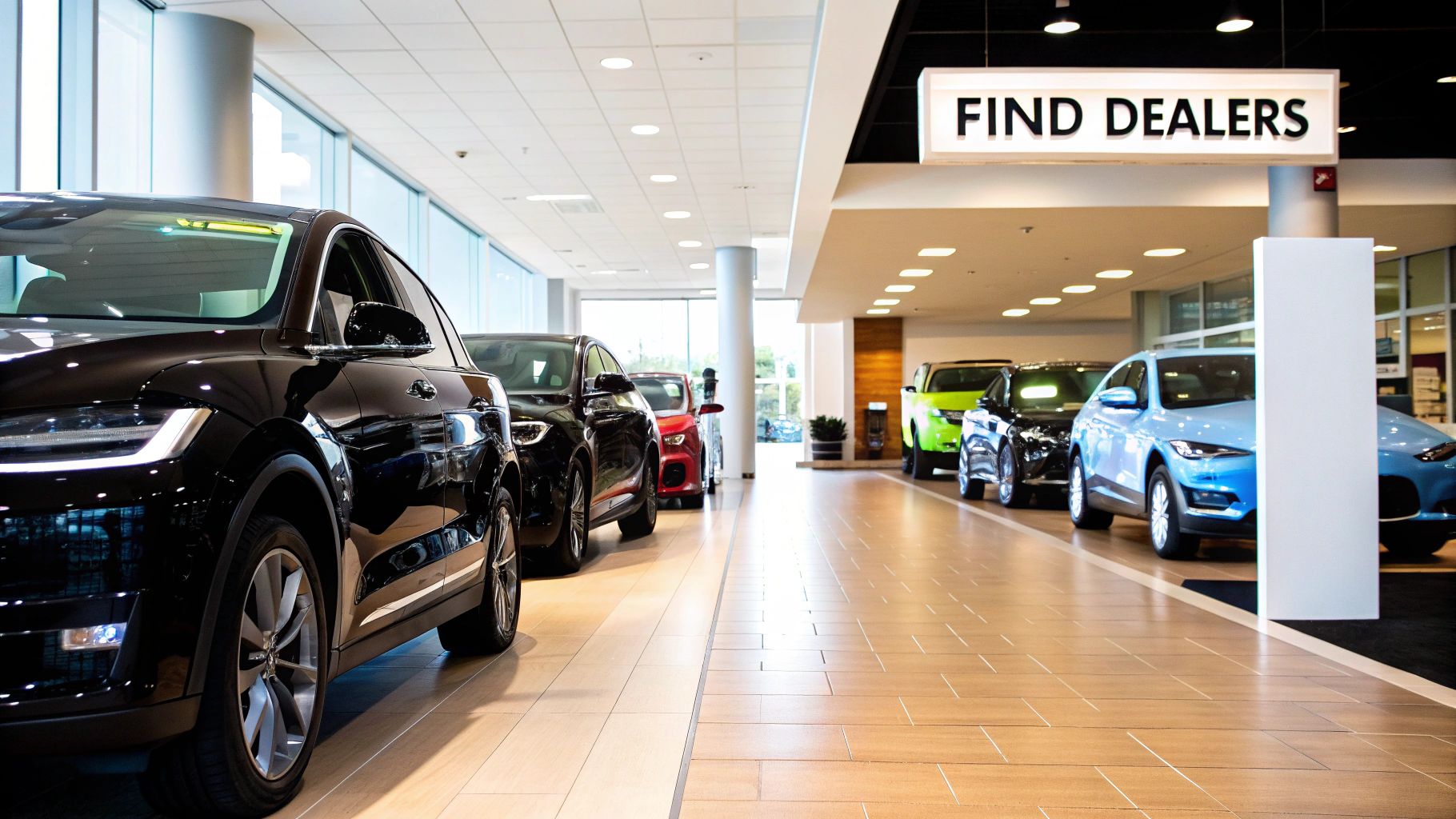
Making the leap to an electric car in Tanzania is an exciting move. Still, it's completely normal to have some final questions before you dive in. We've compiled the most common queries we get from buyers just like you, offering clear, practical answers based on our experience.
Think of this as the final piece of the puzzle. These aren't just theoretical answers; they come from the real-world experiences of drivers who have already made the switch. Let's get these questions sorted so you can move forward with total confidence.
How Long Does It Take To Import an Electric Car?
From the moment you finalise the purchase to the day your EV is registered and ready to drive in Tanzania, you should plan for a timeframe of about 6 to 10 weeks.
This estimate covers all the essential steps: ground transport to the departure port, the ocean freight journey to Dar es Salaam, and then the crucial customs clearance process. Once it's cleared, the final step is getting it registered locally with the TRA. This is where working with a seasoned importer like EV24.africa really pays off—we handle the logistics to avoid delays and keep you in the loop the entire time.
Are There Enough Charging Stations for Long Journeys?
Tanzania's public charging network is growing, and that's the key thing to remember. Right now, you'll find a decent number of stations in urban centres like Dar es Salaam and along some major transport routes. For your day-to-day driving, a simple overnight charge at home will cover all your needs.
When it comes to longer trips, a little bit of planning goes a long way. You’ll just need to map your route to make sure it includes the available charging stops.
While the network is still developing, new public and private charging points are popping up all the time. The situation is getting better every month, making long-distance EV travel more and more practical.
What Happens If My EV Needs Repairs?
Here's one of the best parts about owning an EV: they require far less maintenance. Say goodbye to oil changes, spark plugs, and exhaust system problems. Of course, components like tyres, brakes, and suspension will still need the usual checks, just like any car.
A growing number of workshops, especially in the bigger cities, now have technicians trained to service electric vehicle systems. A smart move is to pick a popular EV model, like one from a brand such as BYD. Why? It simply increases the chances that spare parts are already available locally through your importer or specialised garages.
Can I Get a Car Loan for an Imported EV?
Yes, you absolutely can. Most major banks in Tanzania now offer financing for vehicles that includes imported electric cars. The application process itself is pretty much the same as it is for a conventional petrol or diesel car.
You'll typically need to show:
- Proof of a steady income.
- The required down payment.
- A pro-forma invoice from the seller for the specific EV you want to buy.
Our best advice? Talk to your bank beforehand to get pre-approved. This will give you a clear understanding of their requirements for financing an imported EV and let you shop with a firm budget in hand.
Ready to find the perfect electric vehicle for your needs? At EV24.africa, we simplify the entire process, from selection and inspection to shipping and registration, making it easier than ever to buy an electric car in Tanzania. Explore our wide range of certified EVs today at https://ev24.africa.


